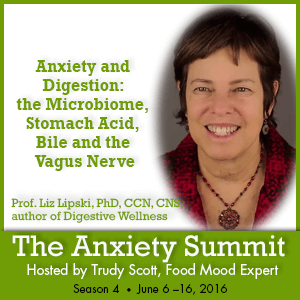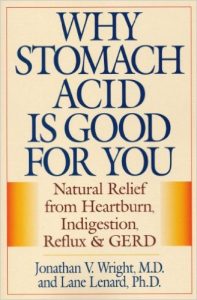
Prof. Liz Lipski, PhD, CCN, CNS, was interviewed on the Anxiety Summit by host of the Anxiety Summit, Trudy Scott, Food Mood Expert and Nutritionist, author of The Antianxiety Food Solution.
Anxiety and digestion: the microbiome, stomach acid, bile and the vagus nerve
- The microbiome – how these microbes are “us” and not different from us
- Low stomach acid and the effects on protein/zinc/iron absorption, and candida
- Low bile production and fat absorption issues
- The vagus nerve, enteric nervous system and neurotransmitter production
Here are some gems from our interview:
So just to start the microbiome itself is not something separate from us but it’s the most newly recognized organ that we have in the human body. And it’s comprised of viruses, bacteria and fungi. And they’re like our rainforest and they live in every epithelial cell surface of our body so they’re on our skin, they’re in your lungs, in your hair, in your nailbeds. They’re in your genitourinary system, in your digestive system, in your nose. They’re really everywhere and I think that we’re also going to find that we have these microbes inside of our brain and inside of our liver and I think the more we learn we’re going to find that they’re really everywhere.
The thing that excites me about them is that they really help run our metabolism, help determine whether we’re fat or thin, help determine what our moods are like and how we feel.
I just love this comment about the microbiome:
And honestly I never know are we just a big bag for carrying around these microbes and they’re really the intelligence in our body or what? Because they’re kind of like the superstars and we’re really a super organism. And without them we don’t function at all.
Here is some of what covered in the gut brain connection section:
We make a lot of neurotransmitters in our gut. In fact we make about 80 to 90 percent of our neurotransmitters like serotonin. We make most of it in our digestive system and not in our brain at all. And when you start looking at it, it’s like wow, you look at dopamine and epinephrine and norepinephrine and all of these are made in great abundance in the digestive system itself and again they help modulate again the microbiome. They help modulate gut motility, so how fast or how slow the food moves through our digestive system.
Here is a fascinating article that covers much of the new research. The tantalizing links between gut microbes and the brain : Neuroscientists are probing the idea that intestinal microbiota might influence brain development and behaviour.
We cover hydrochloric acid and minerals:
So hydrochloric acid is really important for that. It also helps us just break down proteins so that our digestive enzymes don’t have to work so hard. And then it also in the beginning of the small intestine which is called the duodenum -it’s the first 12 to 18 inches – what happens is that the acid is still there before it get neutralized by the pancreas which secretes basically baking soda and neutralizes it because it’s done its job. But in that first big part of the small intestine, the duodenum, is where we absorb iron and calcium and zinc and to a lesser extent magnesium and copper. And so when we don’t have enough acid we’re more likely to get mineral insufficient.
This is the book she mentions in the interview – Why Stomach Acid Is Good for You: Natural Relief from Heartburn, Indigestion, Reflux and GERD by Jonathan Wright
Here is Liz’s fabulous book Digestive Wellness 4th edition
Here is the Stomach Acid/Hydrochloric Acid Test handout
If you are not already registered for the Anxiety Summit you can get live access to the speakers of the day here: www.theAnxietySummit.com
Missed this interview or can’t listen live? Or want this and the other great interviews for your learning library? Purchase the MP3s or MP3s + transcripts and listen when it suits you.
You can find your purchasing options here.: Anxiety Summit Season 1, Anxiety Summit Season 2, Anxiety Summit Season 3, and Anxiety Summit Season 4.

